(Photo ALLISON BAILEY)
Israel launched retaliation strikes against Iran late Friday, responding directly to Tehran’s large-scale ballistic missile strike against the nation, the IDF confirmed.
A series of explosions rattled Tehran and the nearby city of Karaj, reportedly marking the onset of an Israeli retaliation against Iran, according to an IDF spokesperson. Iranian state media confirmed blasts echoing through key locations, including the Imam Khomeini International Airport as speculation surged pointing to coordinated Israeli airstrikes on high-value targets in Iran.
“In response to months of continuous attacks from the regime in Iran against the State of Israel – right now the Israel Defense Forces is conducting precise strikes on military targets in Iran. The regime in Iran and its proxies in the region have been relentlessly attacking Israel since October 7th – on seven fronts – including direct attacks from Iranian soil,” IDF Spokesperson Rear Admiral Daniel Hagari said.
“Like every other sovereign country in the world, the State of Israel has the right and the duty to respond. Our defensive and offensive capabilities are fully mobilized. We will do whatever necessary to defend the State of Israel and the people of Israel.
Israeli official confirms Israel launched an attack against Iran https://t.co/KVCLmNGlwO
— Barak Ravid (@BarakRavid) October 25, 2024
Arab media reported that the strikes may have targeted the headquarters of Iran’s Islamic Revolutionary Guard Corps (IRGC), the Jerusalem Post reported. This incident follows reports of a fire at an Iranian Defense Ministry site in Tehran, though local fire officials denied any connection to military action, suggesting it was unrelated.
The ramifications of the attack appear to stretch beyond Iran’s borders as explosions were also reported in parts of Syria and Iraq, where air defense systems were reportedly engaged to counter incoming threats, as indicated by Israeli outlet Maariv, JPost stated. The situation remains fluid as Tehran and neighboring states assess the fallout, with multiple regional defense systems now active and military activity escalating, the potential for further confrontations and regional instability is high.
As both nations brace for further retaliation, U.S. and Israeli officials hold hope for a restrained Iranian counter-response to avoid a spiraling escalation in violence, Axios reported. To deter further escalation, the U.S. recently increased its military presence in the region, bolstering Israel‘s defenses and potentially discouraging Iranian retaliation.
The Iranian military fired drones toward Israel in April and followed up on this earlier aggression by launching ballistic missiles into Israel earlier in October, with reports suggesting that this might be just the initial phase of the attack. About 200 missiles were fired, and for months, Iran has threatened retaliation against Israel for the killings of leaders associated with its proxy groups, including Hamas leader Ismail Haniyeh and Hezbollah leader Hassan Nasrallah.











